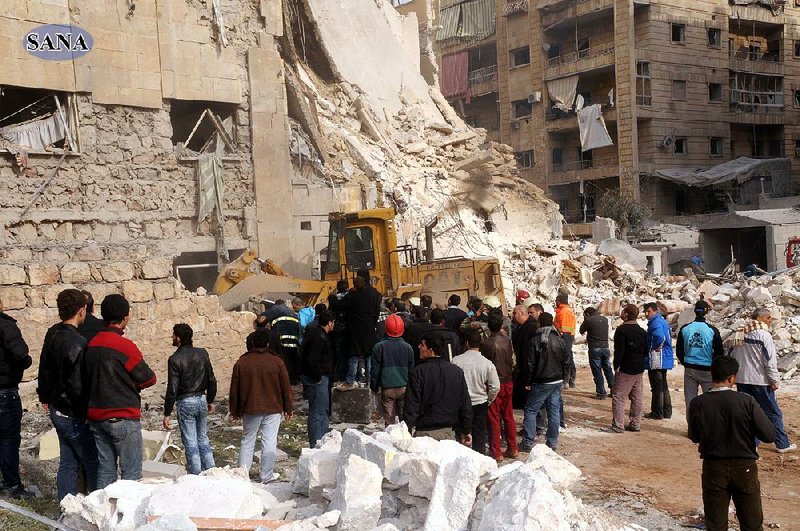BEIRUT — A rocket slammed into a building in Syria’s northern city of Aleppo, and two suicide bombers struck near a mosque in the south Friday, capping a particularly bloody week in the country’s civil war with more than 800 civilians killed, including an unusually large proportion in government-held areas.
The residential building struck in Aleppo was in a part of the city controlled by regime forces, as was a university hit in Aleppo earlier in the week in an attack that killed 87 people, mostly students. The government accused rebels in both attacks, saying they hit the locations with rockets, a claim the opposition denies.
But if confirmed, it would signal that the rebels have acquired more-sophisticated weaponry from captured regime bases and are now using them to take the fight more into government-held areas to break a months-long stalemate in the war.
Rebels have in the past posted videos showing them capturing heavy rockets — apparently of the style fired from truck-mounted launchers — at regime military bases that they have overrun. But it is not clear whether the fighters have — or are able to — use any of the ballistics. The rebels’ main weaponry are automatic rifles and rocket-propelled grenades.
Rockets would for the first time give them a greater range, an advantage that until now the regime military has overwhelmingly held, with its arsenal of warplanes, helicopters, artillery, rockets and mortars. Regime bombardment has caused heavy civilian casualties — and if the rebels start blasting back with sometimes inaccurate rockets, the civilian toll would likely rise.
But the opposition has denied being behind the Aleppo university strike and the hit Friday on the residential building, which one activist group said killed 12 people. The Local Coordination Committees of Syria, an activist group, and the Aleppo Media Center, a network of anti-regime activists, accused the regime of hitting the building with an airstrike.
“It was an air raid,” said Aleppo-based activist Abu Raed al-Halabi. When asked why the regime would attack a government-held area, al-Halabi said most people in Aleppo are opposed to the regime.
Al-Halabi said the rebels have captured some rockets around the capital, Damascus, but not in the Aleppo region. “If they have such missile, they would have fired it at the Military Intelligence headquarters,” he said.
Even if the rebels have captured surface-to-surface rockets, it won’t be a turning point in their battle against the regime of President Bashar Assad, said Aram Nerguizian, a Middle East security expert at the Center for Strategic and International Studies in Washington.
Such systems would “do little to erode [regime] air power, effectively target [its] infrastructure, turn the tide of the conflict or change the broader strategic picture,” he said. And rebel use of rockets could backfire, since “these inaccurate systems are more likely to produce either no impact or kill more civilians than Syrian military forces.”
Friday’s strike in Aleppo and suicide car bombings in the southern town of Daraa occurred during a particularly bloody week in Syria’s nearly 2-year-old conflict. Since the previous Friday, more than 1,000 people have been killed, including 804 civilians, 214 soldiers and 20 army defectors fighting with the rebels, according to the Syrian Observatory for Human Rights, a London-based activist group that gathers information from a network of contacts on the ground.
An Al-Jazeera TV correspondent was killed Friday in Syria, the second journalist to lose his life in as many days covering the civil war. Mohammed al-Masalmeh was shot by a sniper while covering fighting in his hometown of Busra al-Harir in the south. A day earlier, French journalist Yves Debay was killed by a sniper in Aleppo.
Around 200 civilians were killed this week in governmentcontrolled areas. The bulk of them died in the strike on the university in Aleppo and in a mass killing Thursday in the central town of Haswiyeh, where opposition activists say a pro-government militia torched houses and killed more than 100 people.
The residential building hit Friday was in a regime-held zone. Syrian state TV showed footage of the building with several floors collapsed, with one man carrying a baby out of the building and another man clutching his head as blood ran down his forehead. Residents also were seen looking for people buried in the rubble. At least one injured person on a stretcher was seen being carried away in a Red Crescent ambulance.
State TV said that soon after, two suicide car bombs detonated near a mosque in Daraa, causing casualties among worshippers as they left from weekly prayers. TV blamed the blast on Jabhat al-Nusra, an al-Qaida-linked group that the U.S. has declared a terrorist organization but which fights alongside Syrian rebels.
State TV said the Aleppo and Daraa attacks caused casualties but did not give an exact number. The Syrian Observatory for Human Rights said 12 people were killed in Aleppo and five in Daraa.
Daraa is the birthplace of the revolt against Assad’s rule that began in March 2011. The uprising began as peaceful protests but quickly turned into a civil war after an intense government crackdown. More than 60,000 people have been killed in the violence, according to a recent United Nations estimate.
Information for this article was contributed by Zeina Karam and Suzan Fraser of The Associated Press.
Front Section, Pages 5 on 01/19/2013


